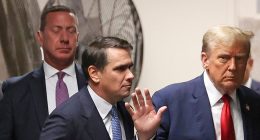
In The New York Times Book Review in December 1970, he wrote that the United States “desperately needs a sane and honest inquiry into the question of war crimes and atrocities in Vietnam.”
Three months later, he concluded that there was no moral or legal difference between the killing of 25,000 noncombatants in the Philippines during World War II, for which the United States had tried and hanged a Japanese general, and the deaths of tens of thousands of civilians in Vietnam. “The more perspective we gain on our behavior, the uglier our conduct appears,” he wrote.
Mr. Ellsberg, who had copied the Pentagon Papers illicitly in the hope of hastening the end of the war, wrote in his 2002 memoir that he had offered them to Mr. Sheehan and later gave him a key to the apartment in Cambridge, Mass., where he had stashed them. He told Mr. Sheehan he could make notes but not photocopy the documents. He learned only later, he wrote, that Mr. Sheehan had returned when Mr. Ellsberg was out of town, removed the papers, photocopied them and taken the copies back to The Times.
Convinced that the papers were too important for him to run the risk that they might never be made public, Mr. Sheehan took advantage of Mr. Ellsberg’s absence from Cambridge to override his instructions, photocopy everything and spirit it back to Washington in bags strapped onto an airplane seat beside him.
Accepting an award later that year, Mr. Sheehan said that The Times, in publishing the papers, had given “to the American people, who had given to those who governed us 45,000 of their sons and $100 billion of their treasure, a small accounting of a debt that can never be repaid.”
“But if to report now be called theft, and if to publish now be called treason, then so be it,” he added. “Let God give us the courage to commit more of the same.”
Mr. Sheehan was the author of three other books, including “After the War Was Over: Hanoi and Saigon,” based on a trip to Vietnam in 1989, and “A Fiery Peace in a Cold War: Bernard Schriever and the Ultimate Weapon” (2009), a history of the arms race and the story of the Air Force general responsible for the creation of America’s intercontinental ballistic missile system.
Source: | This article originally belongs to Nytimes.com









